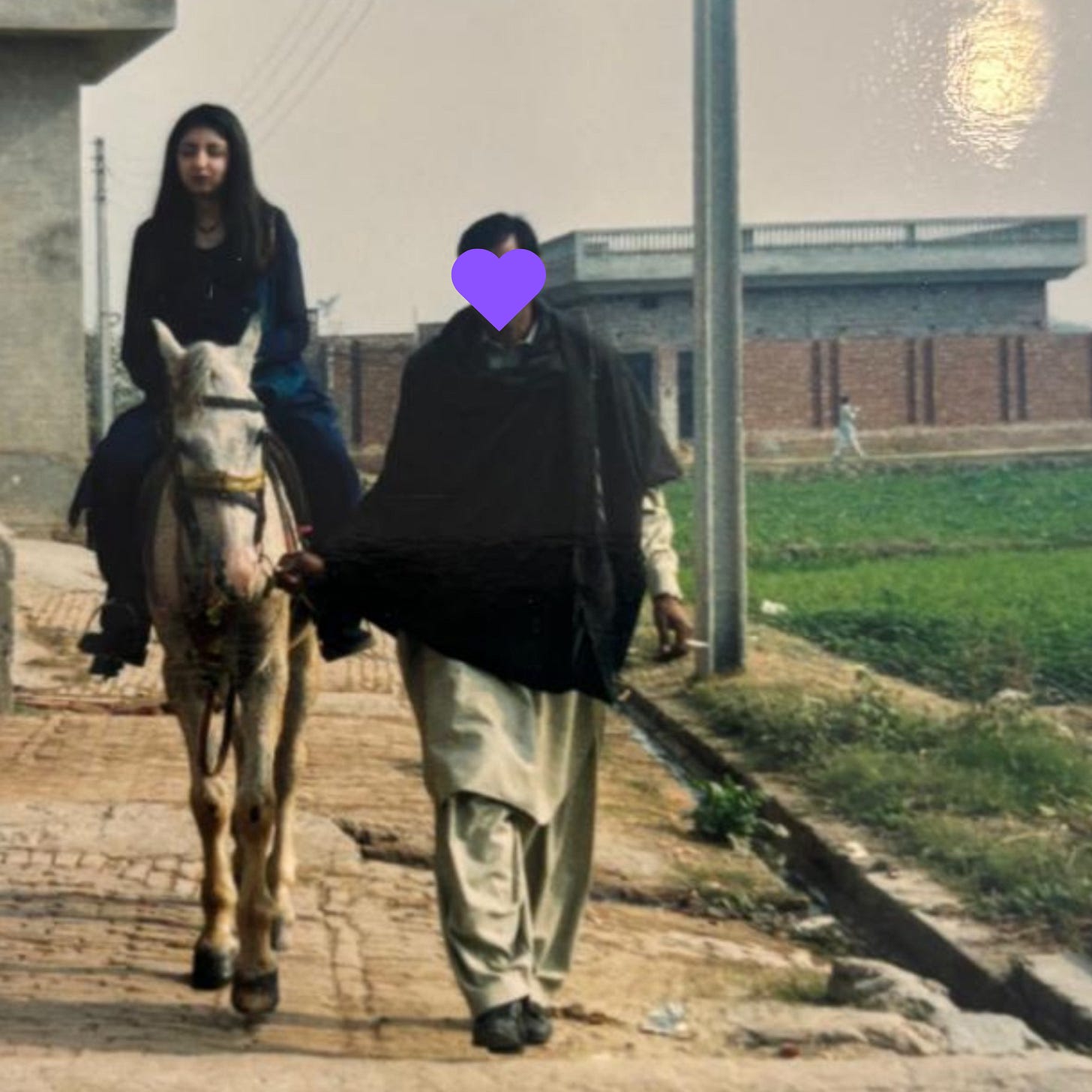"Girls Don't Ride Horses"
A Visit to My Father’s Village—and the Question No One Expected
“Girls don’t ride horses”
I was met with these words during my first visit to my father’s village in Pakistan—a rural place where people farmed the same piece of land handed down for generations.
There was great poverty here.
There was low education.
There were the village’s unspoken rules.
But there was also warmth, hospitality, and the tastiest boiled eggs I’ve ever had.
Those Pakistani chickens know how to lay their eggs!
My uncles, aunts, and cousins were over the moon to meet me—their Canadian relative, visiting from the land of opportunity. It was life-changing.
Just like the whiff of freshly brewed coffee in the morning, I was hit with the realization that maybe those stories my dad told us were true.
My brothers and I used to think he was exaggerating to make us feel “bad” about our privileges.
Traveling four hours each way to school, not having proper shoes, or toilets—yeah right, Dad. People don’t really poop in holes in the ground.
Turned out, they do. And I did, too, while I was there.
This was my first experience abroad and my first visit to a third-world country. Everything felt both perplexing and magical, like being lost in a corn maze and spotting unicorns at the same time.
I’ll always be grateful to my mother for taking me. That trip opened my eyes to life beyond North America, and sparked my lifelong love for exploring new places and people.
The family’s farmland was far from the village, so my uncle took me on foot to proudly show me the piece of earth that had sustained the Cheemas for generations. It was humbling to stand on the land that had fed so many of my relatives.
On the way back, I asked my uncle if I could ride the family’s horse. He looked stunned and gently said, “Girls don’t ride horses.”
“Why, Chachu? What difference does it make if I’m a girl? I have two legs and arms just like any boy; I’ll ride just fine.”
He paused, looked down, then up with a smile, and said, “Teeeeekhhhh.”
His “okay” stretched out like that stretchy cheese from a Pizza Hut commercial, making me think I’d just seen something amazing.
If I close my eyes, I can still hear him say it, like he’s still here with me (he passed away some years ago). That word, that moment, lives on in my memory.
This was a huge deal. My uncle took a brave step away from tradition, risking gossip from the villagers, just so I could ride that horse.
Word spread fast. As we neared the village, little boys in the fields were watching us in disbelief, running back to inform everyone.
By the time we got back, the entire village was on their rooftops, watching.
It felt like a scene from a movie—I remember thinking, Have I really made it? Is this my moment?
I wonder how many little girls in that village saw me and thought, Maybe one day I can ride a horse, too.
Maybe some of them even did.
That thought brings a smile to my face every time it surfaces.
This wasn’t the first time I’d been told I couldn’t do something because I was a girl.
Gender norms had traveled with my family from Pakistan to Canada, and I’d been asked to adjust my behavior many times to “be more like a girl.”, reminded that certain things were off-limits to me for the same reason.
As an adult, I understand that this is common in many cultures; instead of holding mine accountable, I hold the next generation accountable.
As we grow, we have a responsibility to do better for ourselves and for those who come after us.
Moments of support like my uncle’s act of courage can make all the difference.
His willingness to challenge tradition gave me strength in ways he may never have imagined.
If an uneducated man raised in a world of strict norms could pause and choose change, imagine what those of us born with more privilege can do.
This memory reminds me of something called the Lindy Effect—a concept that suggests the longer something has existed, the more likely it is to continue.
While it’s often valuable to respect traditions, just because something has been around forever doesn’t mean it’s the best way to move forward.
The human condition is to grow, to question, and to evolve. We should ask why things are the way they are—and consider fairer, more progressive ways to live.
Society often operates in “zombie mode,” bogged down by so much fear and stimulus that we rarely pause to question even the smallest processes. And so the Lindy Effect persists, keeping us stuck in patterns that may not serve us.
As I look back, I realize that the courage to challenge what “has always been” opens doors to what “could be.”
My uncle’s small act of letting me ride taught me that impactful change often begins in the quietest moments, with the simplest questions.
Like when my 4-year-old questioned my rule about not letting him eat protein bars: “Mama, don’t kids’ bodies need protein too?” That earned him a quarter of a protein bar, as needed.
So, what are you going along with that might need to change?
Can you start by asking why?





